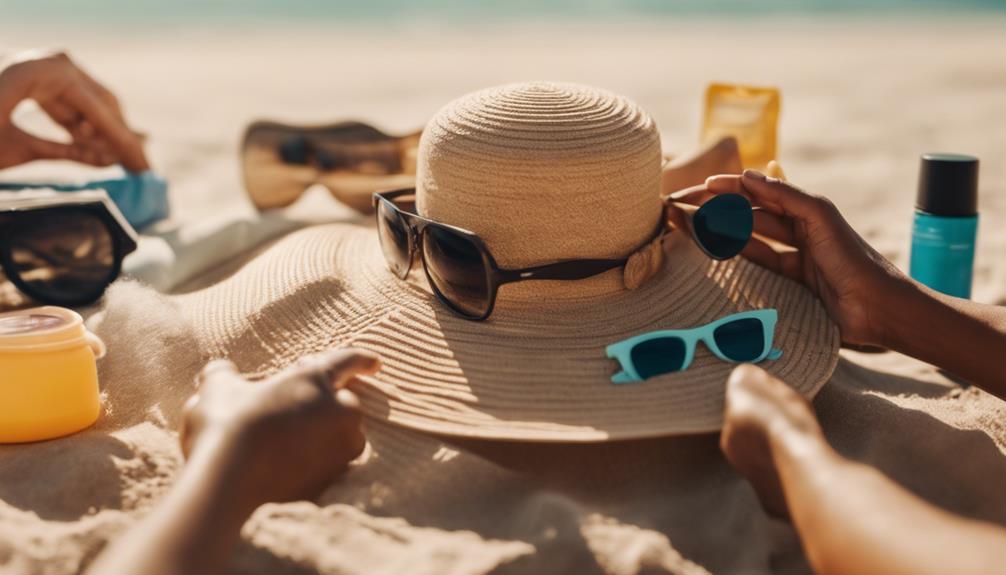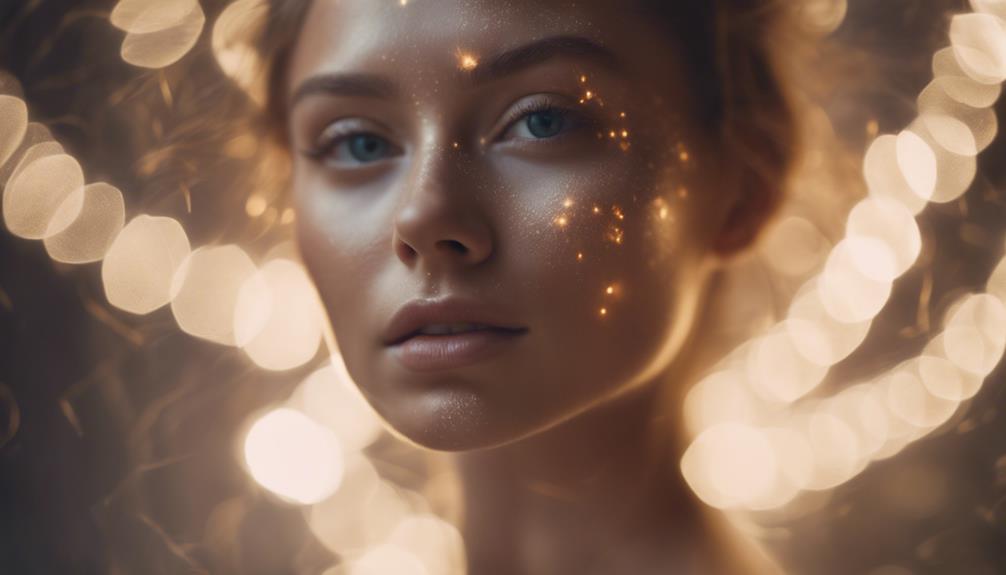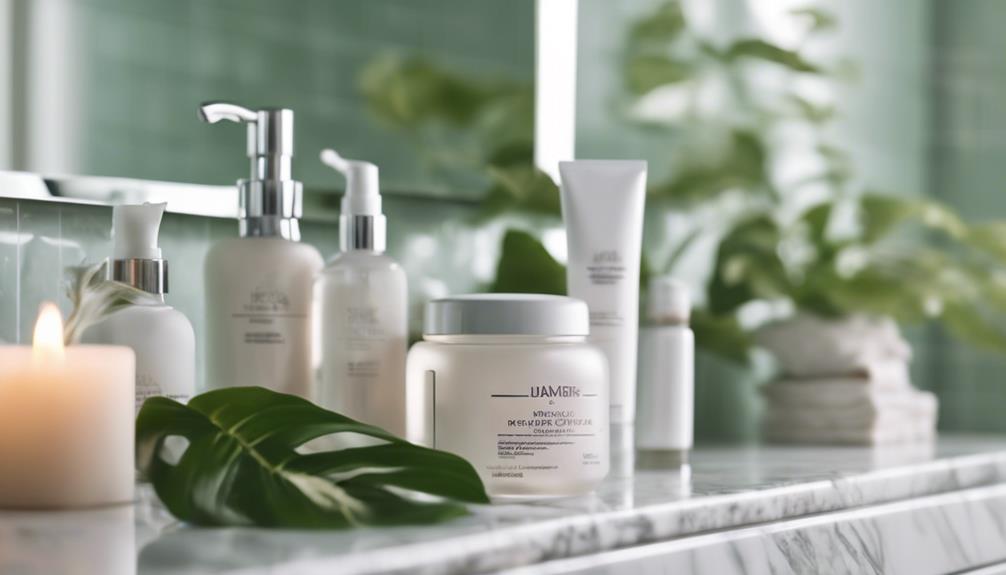Yes, darker skin tones absolutely need sunscreen. While melanin offers some protection, it's equivalent to only SPF 13, which isn't enough to block harmful UV rays. This makes you vulnerable to sunburn, hyperpigmentation, and skin cancer, especially melanoma, which is on the rise among people of color. Many individuals with darker skin often underestimate their sun exposure risks. Using a broad-spectrum sunscreen with at least SPF 30 every day, even when it's cloudy, is crucial. Staying informed about proper sun protection can help maintain your skin's health and prevent serious issues. There's more essential information you should consider.
Key Takeaways
- Darker skin tones still need sunscreen as melanin offers only minimal protection equivalent to SPF 13, which is insufficient for full defense.
- Over 50% of individuals with darker skin have reported experiencing sunburn, highlighting the risks associated with sun exposure.
- Rising skin cancer rates among people of color necessitate regular sunscreen use and skin checks for early detection of issues.
- Common skin cancer symptoms may be less visible on darker skin, making awareness and regular monitoring essential for effective treatment.
Understanding Sun Damage
Sun damage affects everyone, regardless of skin tone, as UV rays can penetrate and harm skin at any melanin level.
While darker skin contains more eumelanin, which offers some natural protection against UV radiation, it doesn't mean you're immune to sun damage. Many individuals with darker skin tones experience issues like sunburn and hyperpigmentation. In fact, studies show that over half of individuals of African ancestry in the UK have reported sunburn, proving that UV exposure affects all skin types.
Hyperpigmentation can lead to uneven skin tone and dark spots, especially after excessive sun exposure. This is particularly concerning for darker skin, as these conditions can be more pronounced and harder to treat.
Additionally, while skin cancer is less common in darker skin, it's still a risk, with acral melanoma being more frequent and often diagnosed at later stages. This highlights the importance of being proactive about sun protection.
Wearing sunscreen isn't just for lighter skin; it's essential for everyone to minimize sun damage and reduce the risk of skin cancer, regardless of melanin levels.
Skin Cancer Risks for Dark Skin

While skin cancer is often perceived as a lesser risk for those with darker skin tones, the reality is that it still presents significant dangers that shouldn't be overlooked. Skin cancer, particularly melanoma, can affect people of color, including Black patients, and has been on the rise. Despite having more melanin, which offers some protection, you're still vulnerable to harmful ultraviolet (UV) rays.
Acral melanoma is one type that frequently occurs in individuals with darker skin. It can appear on non-sun-exposed areas like your palms and soles, making it essential to pay attention to any skin changes. Statistics show that Black women have experienced a staggering 75% increase in melanoma cases over the last few decades.
Unfortunately, late-stage diagnoses are more common among minority groups, which can lead to poorer outcomes. To combat this issue, regular skin checks are important. Stay vigilant, and don't ignore any unusual spots or changes.
Using sunscreen is crucial for everyone, including those with darker skin tones, to help protect against skin cancer and promote overall skin health. Remember, awareness is your best defense.
Myths About Sunscreen Usage

Many people believe that those with darker skin tones can skip sunscreen, but this misconception puts them at risk for serious skin damage.
While it's true that higher melanin levels provide some natural UV protection, it's only about equivalent to SPF 13. That's not nearly enough to guard against harmful UV damage.
Here are a few myths about sunscreen that you should be aware of:
- Darker skin tones are immune to sunburn: Sunburn can affect anyone, regardless of skin color, leading to long-term damage and increased skin cancer risks.
- Sunscreen's only necessary on sunny days: UV rays can penetrate clouds and windows, making daily sunscreen application essential, rain or shine.
Importance of Melanin

Melanin plays an essential role in protecting your skin from UV radiation, but it has its limits.
While higher melanin levels can reduce the risk of sunburn, they don't provide complete protection against skin damage or cancer.
That's why you still need to prioritize using sunscreen, no matter your skin tone.
Melanin's Protective Role
The protective role of melanin in darker skin tones offers some natural defense against UV radiation, but it shouldn't be your only line of defense. While melanin provides a level of UV protection equivalent to about SPF 13, that's not enough to eliminate the risk of skin cancer and other issues. Here's what you should know:
- Melanin absorbs UV radiation, reducing DNA damage in dark skin.
- Higher melanin levels may lower the incidence of visible signs of sun damage, like sunburn.
Even with these advantages, studies show that darker skin can still experience significant DNA damage from UV exposure. This means that while you mightn't see immediate effects, the risk of skin cancer and other long-term problems remains.
To protect yourself effectively, applying sunscreen is essential. It acts as a secondary shield, complementing the natural defenses provided by melanin. Don't underestimate the importance of sunscreen, as it helps safeguard against both immediate and long-term skin issues.
Prioritize your skin health by combining melanin's benefits with a reliable sunscreen.
Limitations of Melanin
While melanin offers some protection against UV rays, it has significant limitations that can put darker skin tones at risk if sunscreen isn't used. The natural SPF provided by melanin is only about 13, which isn't enough for complete sun defense. Even with higher melanin levels, you can still experience skin issues from UV exposure, including DNA damage and sunburn.
Contrary to common misconceptions, melanin alone doesn't guarantee immunity from skin cancer. In fact, studies show that melanoma rates are on the rise among people of color, particularly those with darker skin tones. Although you mightn't see immediate signs of sun damage, the long-term effects can include hyperpigmentation and an increased risk of skin cancers.
Need for Sun Protection
Understanding the role of melanin in your skin's defense against UV rays is important for maintaining your skin health. While melanin provides some natural protection, it equates to only an SPF of about 13. This isn't enough for adequate sun protection. Even if you have darker skin tones, you can still suffer from UV exposure, including sunburn, skin damage, and hyperpigmentation.
Consider these significant points:
- People of color, including those with darker skin, face rising rates of skin cancer.
- Relying solely on melanin for protection can lead to serious skin issues.
You can't underestimate the importance of sunscreen, regardless of your melanin levels. Even though melanin absorbs UV light and reduces potential DNA damage, it doesn't eliminate the risk of skin cancer.
To effectively protect yourself from the harmful effects of the sun, make sunscreen a non-negotiable part of your routine. Prioritizing sun protection is key to maintaining healthy skin and preventing long-term damage.
Symptoms of Skin Cancer

You need to be aware of skin cancer symptoms, which can differ based on your skin tone.
Common signs include new growths, changes in moles, or sores that won't heal.
Recognizing these variations is vital for early detection and treatment, especially for darker skin tones.
Common Skin Cancer Symptoms
Common signs of skin cancer include new growths, changes in existing moles, and persistent sores that don't heal. Recognizing these symptoms is essential, especially for individuals with skin of color, as awareness can greatly impact early detection and treatment outcomes.
Here are some key indicators to watch for:
- New, unusual spots or growths on your skin
- Changes in the size, shape, or color of existing moles
Squamous cell carcinoma often presents as nonhealing, painful lesions, particularly in less sun-exposed areas.
Melanoma, a more aggressive form of skin cancer, can develop in areas with less pigment, such as the palms or soles of the feet.
Acral melanoma is also a concern for those with darker skin tones, often showing changes in color and size that require prompt attention.
Variations by Skin Tone
Skin cancer symptoms can differ considerably based on skin tone, with individuals of darker skin often experiencing atypical signs that may be overlooked.
People of color have more melanin, which can mask visible signs of skin cancer, making early detection imperative. For instance, acral melanoma is more common in darker skin and often appears on less pigmented areas like the palms and soles of the feet.
You should also be aware that squamous cell carcinoma might show up in less sun-exposed areas, so it's important to monitor these regions regularly. While basal cell carcinoma symptoms can look similar across all skin types, they usually appear as nonhealing, painful lesions.
Given these variations, it's critical to schedule regular skin checks with a dermatologist who understands the unique risks associated with darker skin tones.
Wearing sunscreen isn't just for lighter skin; it plays a significant role in protecting all skin types from potential harm.
Prevention Strategies for Everyone

Daily sunscreen application is essential for everyone, regardless of skin tone, to shield against harmful UV rays and prevent long-term skin damage. While melanin offers some natural protection, it doesn't eliminate the risk of skin cancer. As a result, adopting effective protective measures is key.
Here are some strategies to enhance your sun safety:
- Use broad-spectrum sunscreen with an SPF of 30 or higher daily, even on cloudy days.
- Wear sun-protective clothing, wide-brimmed hats, and sunglasses to block UV rays.
Consulting a dermatologist can provide personalized advice on skin care and sun protection tailored to your specific needs.
Remember, everyone can benefit from these preventative strategies, as early detection and proactive care are vital for maintaining healthy skin.
Community outreach and education about the importance of sunscreen and sun safety can also help promote better skin practices among diverse populations.
Taking these steps can greatly reduce your risk of skin issues and enhance your overall skin health. Stay informed, stay proactive, and enjoy the sun safely!
Choosing the Right Sunscreen

When selecting sunscreen, it's important to choose a broad-spectrum formula with an SPF of 30 or higher for effective protection against UV rays. This guarantees you're shielded from both UVA and UVB rays, vital for all skin tones.
Consider opting for mineral sunscreens containing zinc oxide or titanium dioxide, as they're less likely to leave a visible white cast on darker skin. Additionally, tinted sunscreens with iron oxide can offer extra protection against visible light, which may exacerbate hyperpigmentation.
If you plan to sweat or swim, make certain your sunscreen is water-resistant and remember to reapply every two hours for continuous protection.
Here's a quick comparison of sunscreen options to guide your choice:
| Type of Sunscreen | Key Benefits |
|---|---|
| Broad-Spectrum | Protects against UVA/UVB rays |
| Mineral Sunscreen | Less visible cast on darker skin |
| Tinted Sunscreen | Extra protection against visible light |
| Water-Resistant | Ideal for swimming or sweating |
| SPF 30 or Higher | Guarantees adequate protection |
Always check ingredient labels for harmful chemicals, and consider consulting with a dermatologist for personalized recommendations.
Regular Skin Checks

Regular skin checks play an essential role in monitoring your skin health and spotting any unusual changes early on. These checks are particularly important for people of color, as they can help identify potential skin cancer cases that might otherwise go unnoticed. By being proactive, you can enhance your awareness and develop effective prevention strategies.
Here are a few key points to keep in mind:
- Schedule a baseline skin exam with a dermatologist around age 20 to establish a reference for future evaluations.
- Be vigilant about new growths or changes in existing moles, as these can indicate skin damage or cancer.
Consulting a dermatologist not only allows for personalized care plans but also equips you with the knowledge needed for maintaining skin health. Early detection is essential; it can make a considerable difference in treatment success and survival rates.
Community Education and Awareness

Community education and awareness play an essential role in changing the perception that darker skin tones don't need sun protection, emphasizing that everyone is at risk for sun damage and skin cancer.
As a member of a community, you can help dispel myths surrounding skin cancer in People of Color. It's vital to understand that all skin types, regardless of pigmentation, can suffer from sun damage.
Organizing outreach programs focusing on the unique risks of sun exposure for darker skin can greatly enhance knowledge about skin health. By educating others on symptoms like hyperpigmentation and atypical skin growths, you can help guarantee early detection.
Collaborating with local health organizations to offer free skin screenings and educational workshops fosters a proactive approach to preventative care.
Utilizing social media platforms and influencers from diverse backgrounds can further amplify awareness. Share accurate information about the importance of wearing sunscreen and the real risks associated with neglecting skin protection.
By actively participating in community education, you contribute to a more informed and health-conscious environment that prioritizes skin health for everyone.
Let's work together to change perceptions and promote safe sun practices!
Seeking Professional Advice

Consulting a dermatologist is essential for anyone with darker skin tones to develop effective sun protection strategies tailored to their unique needs.
Regular skin checks can help you monitor changes in moles or new growths, critical for early detection of skin cancer. Dermatologists understand that skin cancers can present differently in darker skin, which can lead to timely medical consultations and better treatment outcomes.
Here are a few reasons why seeking professional advice is important:
- Personalized Care: A dermatologist can create a skincare routine that addresses specific concerns like hyperpigmentation and sun damage.
- Sunscreen Guidance: They'll recommend the right sunscreen and application techniques to guarantee you're adequately protected.
Frequently Asked Questions
Do Darker Skin Tones Need Sunscreen?
Yes, you need sunscreen, regardless of your skin tone. Even if you have darker skin, you can still get sunburn and long-term damage. Make sure to apply broad-spectrum SPF 30 or higher daily for protection.
Is Dark Skin Resistant to Uv?
Think of dark skin as a sturdy umbrella against UV rays; it offers some protection, but it's not impervious. You still need to shield yourself with sunscreen to prevent hidden damage and keep your skin healthy.
Can Dark Skinned Get Sunburn?
Yes, you can get sunburn, even if your skin is dark. While your higher melanin offers some protection, prolonged sun exposure can still lead to damage, hyperpigmentation, and painful sunburns. Always protect your skin!
Is Sunscreen Needed for Indian Skin?
Yes, you need sunscreen for Indian skin. Even with higher melanin, your skin can suffer from sun damage, hyperpigmentation, and increased cancer risk. Use a broad-spectrum SPF 30 daily to protect against harmful UV rays.
Should Children with Darker Skin Tones Still Wear Sunscreen to Protect from UV Rays?
It is important for children with darker skin tones to still wear sunscreen for vitamin d uv protection. While their skin has more natural melanin, it does not provide complete protection from harmful UV rays. Using sunscreen can help prevent sunburn and reduce the risk of skin damage and cancer.
Is Astrology a Valid Factor in Determining Sunscreen Needs for Different Skin Tones?
Astrology and personal attractiveness should not be considered in determining sunscreen needs for different skin tones. Sunscreen requirements are based on the individual’s sensitivity to UV rays, not their astrological sign or perceived attractiveness. It’s crucial to prioritize skin health and sun protection over unrelated factors like astrology.
Do People with Darker Skin Tones Still Need Sunscreen When Using Tanning Beds?
Yes, people with darker skin tones still need sunscreen when using tanning beds. Sunscreen is one of the essential tanning bed safety tips for everyone, regardless of skin tone. It helps protect against harmful UV rays and reduces the risk of skin damage, premature aging, and skin cancer.
Is It Important for People with Darker Skin Tones to Wear Sunscreen While Tanning?
Yes, it is crucial for people with darker skin tones to wear sunscreen while tanning. Although their skin naturally provides some protection, it is still susceptible to sun damage and increased risk of skin cancer. Also, wearing sunscreen helps to prevent premature aging and keeps the skin healthy while tanning and calorie burning.
Conclusion
In the garden of skin tones, darker hues may seem shielded by melanin, but remember, even the strongest oak can wither under the sun's relentless gaze.
Sunscreen is your protective canopy, guarding against hidden dangers like skin cancer.
Don't let misconceptions cast shadows over your health; embrace regular skin checks and educate your community.
By nurturing awareness, you cultivate a vibrant, resilient future for everyone.
So, slather on that sunscreen and let your skin flourish safely in the sunlight!









